When you’re welcoming a new bundle of joy into the home, you may be a bit preoccupied on the bigger details of what baby might need. You’re busy stocking up on clothes, linens, strollers, carriers, and bottles.
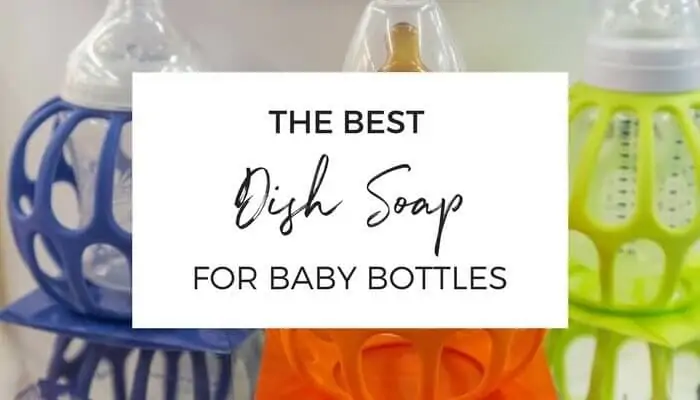
It’s also important, however, to think about which soap you’ll be using to clean out baby bottles. Regular dish soap may be too harsh for baby bottles because little stomachs are extremely sensitive to chemicals.
In a rush? My recommendation for a baby bottle liquid soap: Babyganics Dish Dazzler Foaming Dish and Bottle Soap at Amazon.
| Best Dish Soap for Baby Bottles | Why We Like It |
|---|---|
| 1. Dr. Bronner’s Pure-Castile Liquid Soap – Baby Unscented | It’s organic and concentrated: a bottle will last months. |
| 2. Babyganics Dish Dazzler Foaming Dish and Bottle Soap, Fragrance-Free | It rinses clean, is a good bargain, and is gentle on our hands. |
| 3. Dapple Fragrance-Free Baby Bottle & Dish Liquid | Its baking soda recipe totally gets rid of that milky smell. |
| 4. Elysium Eco World Natural Baby Bottle Dish Soap | It’s great for babies and moms with allergies and is all-natural. |
What to expect from a dish soap
When you’re expecting a child, you also expect more from the household products you buy. Baby’s health is priority number #1! That’s why the dish soap you use to clean baby supplies is important. Getting baby’s milk bottle squeaky clean is essential so that bacteria doesn’t form inside the bottle.
To ward off potential bacteria, it’s important to clean baby bottles thoroughly and as quickly as possible after the baby is done eating. By starting with a quick rinse, you can ensure that most leftover milk particles will be washed away. To get a really thorough and deep clean for your baby’s bottles, you’ll want to use a dish soap created specifically for cleaning them.
Many brands of regular dish soaps are petroleum-based soaps. This is usually fine for regular run of the mill dish washing but may be the wrong choice for washing plastic baby bottles. Petroleum-based soaps leave a filmy residue on plastic bottles and can be bothersome when you’re trying to ensure that the baby’s bottles are all pristinely clean.
Choosing a free and clear mild detergent will help ensure your baby is both safe and healthy.
Safety tips
When it comes to cleaning baby bottles, most parent’s guides recommend the following:
- Use BPA-free bottles. BPA has been linked to developmental problems in young children.
- Sterilize new bottles before using them. Just because it’s new, doesn’t mean it’s germ-free!
- Sterilize baby bottles at least one a week. Use boiling, steaming, or UV light to sterilize the bottles until the baby is at least a 1 year-old. That’s about when an infant’s immune system begins to kick in.
- Wash the baby bottles and their component pieces in hot water after every use.
How do I properly wash baby bottles with dish soap?
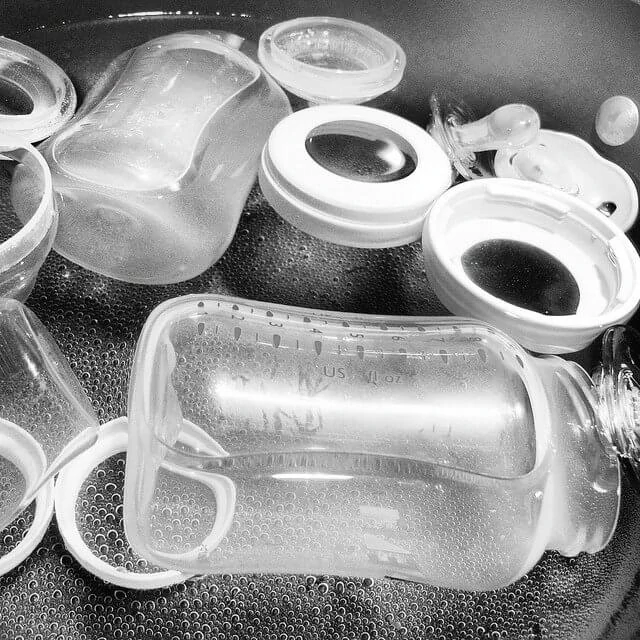
After you’ve selected a dish soap that is suitable for cleaning baby’s bottles, fill the sink (or other bin you’ll be washing the bottles in) with hot water. Separate all the individual pieces of the bottle. A thorough cleaning is necessary for the bottles and their accessories.
Pieces that are small and have grooves are especially hard to clean and require extra attention. A bottle brush can help you get into all those nooks and crannies. Investing in a bottle brush, and a quality dish soap that’s intended for use on baby bottles only can help keep your baby’s bottles clean and free from cross-contamination from your other dishes.
Check out Dr. Brown’s Bottle Brush at Amazon
After you’ve applied the soap and scrubbed them thoroughly with a brush, rinsing the bottles completely will reduce the chance of leaving behind any residue. To be sure your baby bottles do not become cross-contaminated with other food products or regular dish soap, it’s essential that you wash the bottles separately and use a designated sponge or brush for the bottles.
Hand wash or dishwasher?
Many people will argue that using the dishwasher is essential for saving your precious time (especially while trying to care for a baby). The truth is, hand-washing might be more efficient.
Once milk or formula dries up inside a baby bottle, it can become impossible to clean out from those hard to reach areas. This can be especially troublesome if you don’t intend on running your dishwasher after each feeding, or if you don’t have a dishwasher in the first place.
Additionally, choosing to hand-wash baby bottles, instead of throwing them into the dishwasher, can help extend the life of your baby bottles and all their parts.
Tip: Always rinse bottles out with COLD water first. Hot water will make the milk stick to the bottle.
What type of dish soap should I use on my baby’s bottles?
The type of soap you use to hand wash your baby’s bottles should be a mild detergent. If you can manage it, choosing a natural soap may be better for a baby than settling for a soap that’s known to be made of petroleum-based chemicals, which can leave a lingering residue on plastic baby bottles.
There are a plethora of soaps marketed to be safe for use in baby bottles, but you should be wary of brands that do not tout the ‘all-natural’ labeling.
Many dish soaps are full of chemicals that could potentially leach onto your baby’s bottle. Yes, you are technically rinsing off the soap—but this doesn’t mean it’s the greatest choice for your little one.
When a previously-washed bottle is heated back up with milk or formula, chemicals from the dish soap could be absorbed into your baby’s bloodstream if they are not properly removed from the bottle. The best dish soaps for baby bottles will be free and clear of these kinds of chemicals.
Many soaps specifically designed for baby bottles have been made without any potential carcinogens and parabens. Pediatricians even recommend that parents use a dish soap for baby bottles that is vegetable-based to ensure that nothing bad makes its way from your baby’s bottles to their stomach.
Vegetable-based soaps are often the gentlest for the baby too. Additionally, most dish soaps made for baby bottles that are deemed natural, will also be safe as well.
Next, you want to make sure that the soap you choose is free from sulfates, SLS, and sodium lauryl sulfate. These chemicals are often added to soaps to create a foamy lather. However, that lather because of the chemicals can also irritate the baby. Bottle soap needs to be 100% paraben free to ensure it is safe for baby.
There are also some vegan baby bottle dish soaps available, however, even though something is deemed as completely natural, you will still want to check the ingredients.
Recommended brands
So, which dish soaps use natural ingredients and also perform well? Let’s take a look at a few top brands.
1. Dr. Bronner’s Pure-Castile Liquid Soap – Baby Unscented
For years, I’ve been using Dr. Bronner’s brand soap for all kinds of cleaning tasks (with my personal favorite being the peppermint). This soap is made using all-natural, biodegradable, and vegetable-based ingredients. All Dr. Bronner’s soaps are certified organic by the USDA National Organic Program and certified Vegan by Vegan Action.
It’s also incredibly versatile, being gentle enough for bathing but strong enough for general-purpose household tasks, like washing the dishes. You can find it in almond, lavender, and the aforementioned peppermint scents.
Dr. Bronner’s also produces an unscented, mild soap ideal for babies. It contains no fragrance. And with oils like coconut and olive, it’s suitable for people with allergies. An important thing when you’re washing baby bottles regularly.
Like all Dr. Bronner’s soaps, this one is certified organic by the USDA and the National Organic Program. It’s also certified Vegan by Vegan Action.
My favorite thing about this soap is that a little goes a long way. It’s pretty concentrated, so watering it down really means a single bottle of Dr. Bronner’s will last for many, many months. This soap makes a lot of suds which means it does a great job of cleaning. But you’ll likely find a ring of suds left in your sink.
So, if you’re going to use this soap to wash your little one’s bottles, make sure you rinse them thoroughly. This stuff might be all-natural, but you don’t want any of it floating around in your baby’s bottle.
Some folks have reported that the soap leaves their skin very dry and tight. So, if you have very dry skin already, this might not be the best soap for you. During my research, I also came across several complaints about the soap leaving a burning sensation behind. This is a total dealbreaker for me.
Especially since washing baby bottles is a daily exercise. I wouldn’t want my hands to feel uncomfortable after each wash.
Although this soap is advertised as being fragrance-free. It does, in fact, have a scent. Most folks describe it as an earthy smell. I chalk the scent up to the mix of natural ingredients. And personally, I don’t see it as a problem. But you might not like the way it smells. One of the most frequent complaints about this soap is the bottle cap arriving damaged. This can be annoying. Especially if it means there’s a mess of soap everywhere!
The other complaint I found a lot is folks were not happy with the political statements printed all over the label. Of course, this doesn’t have anything to do with the quality of the soap itself. But several customers were highly annoyed by them.
I must admit, I’m not a fan of this soap by Dr. Bronner. I don’t think it’s ideal for washing baby bottles. Although I do enjoy the brand’s other soaps.
2. Babyganics Dish Dazzler Foaming Dish and Bottle Soap, Fragrance-Free
Babyganics dish soap is another non-allergenic soap that harnesses the power of natural ingredients. Free of SLS, phosphates, phthalates, sulfates, fragrances or dyes, you don’t have to worry about harsh chemicals, and it’s very gentle on the hands.
Cleaning dried milk and food from those bottles, sippy-cups, and even pumps can be hard on your hands. So, you need something gentle, that’ll get the job done. Out of all the soaps I’ve reviewed here, I like this one by Babyganics the best. Besides all the all-natural stuff I already mentioned it’s also pediatrician- and dermatologist-tested.
The folks at Babyganics have created this soap with some fancy foaming tech. So, you’ll need less water. But best of all, this stuff rinses off clean as a whistle. So no more worrying about soap suds or residue floating around in your baby’s bottle.
But there are two things I dislike about pump dispensers…
They clog up and drip. Which means sometimes a squirt of soap ends up in the wrong place. Like on your blouse or worse… In your eye!
That’s where Dish Dazzler by Babyganics really surprised me. The pump dispenser magically turns the liquid soap into foam as it dispenses. So there’s no chance of clogging up the nozzle! Or leaving annoying drips on the counter.
I absolutely love this bit of ‘tech’! It keeps things neat and clean. Just the way I like it! I can’t find anything bad to say about Dish Dazzle. I think it offers great value for the money since you get two in a pack, and a little goes a long way here.
And as an added bonus, it’s not tested on animals.
Compared to the soap by Dr. Bronner’s Dish Dazzle really is a steal and, in my opinion, a much better choice.
3. Dapple Fragrance-Free Baby Bottle & Dish Liquid
Dapple cleaning products have been around for a while. It’s no surprise they now have a fragrance free dish soap too. The folks at Dapple have developed something they call ‘green technology’ to help wash away the film left behind by breast milk and formula.
For you, it means they’ve found a way to bind the leftover calcium and other minerals so they can easily be washed away. They also use the age-old baking soda recipe to get rid of the milk odor too.
And to top it off, their soap is free of phthalates, parabens, SLS, SLES, dyes, and preservatives. It targets those pesky problems and it’s safe for cleaning bottles, sippy cups, pacifiers, and breast pumps.
According to other moms and dads, it does a fine job.
The soap comes in pump bottle making it easy dispense and control how much soap you’re using. It seems to rinse away without leaving a residue like other soaps. From my research, I’ve found there are a few things worth mentioning here…
The soap is very runny and doesn’t make a lot of suds, therefore, you’ll be using a lot to get those baby goodies sparkling clean. There have been a few complaints that the fatty residue is not completely removed. But like I mentioned before, you’ll need a lot of soap to get a deep clean.
One of the main complaints though is that the bottles arrived damaged and leaking. Which I’ll chalk down to poor packaging. If you’re getting this dish soap to make sure it’s shipped separately and not along with other items. I love the fact that this soap is made in the United States, so you can be sure there are no toxins lurking around.
Dapple also provides refill pouches. Which is fabulous for your pocket and great for the environment.
Personally, I think this is a worthwhile dish soap for baby bottles. It does a good job of getting rid of that milk odor. And it’s safe for your baby.
Although, I am put off by the fact that so much is needed to get a deep clean.
4. Elysium Eco World Natural Baby Bottle Dish Soap
This baby bottle dish soap by Elysium is probably as natural as they come. The ingredients are not clear on the bottle. But here’s what the manufacturer confirmed at Amazon…
Water, Apple vinegar, Citrus peel extract, Corn extract, Pineapple extract, Coconut extract, glycerin, Mint extract.
It’s also Vegan-friendly and Paraben and SLS free. And my personal favorite, it’s not tested on animals!
The soap is not fragrance-free though. It has a kind of minty scent. So, if you’re after something with no scent, this might not be the one for you. This dish soap does a great job of getting rid of milk and juice odors. And I’ve come across no complaints of it affecting the taste after washing.
Moms and babies with allergies and sensitive skin seem to do well when using this soap. If you or your little one has sensitive skin, this might be your answer.
The pump dispenser is one handed which makes it easy-to-use. And one pump gives a nice big dollop of soap. The soap is a little runny, and it doesn’t make an awful lot of suds. But that’s a trend with dish soap designed for baby’s dishes. It gets the job done all the same.
From my research though, one pump in a sink of water should do the trick just fine. Overall, I think this is a fantastic choice of soap to keep your little one’s dishes sparkling clean. I like the fact that it’s all-natural in the true sense of the word. And it’s great for those of us with pesky allergies.
The only issue I have is I can’t find out where it’s made. This does raise some questions for me. But for what it’s worth, the company’s address is in Jerusalem, Israel.
Frequently Asked Questions
Is Dawn dish soap safe for baby bottles?
I do not recommend Dawn dish soap. While they do not disclose all of their soap ingredients, you can find a MSDS Sheet on the P&G website. MSDS stands for Material Safety Data Sheet. Depending on the particular kind of Dawn dish soap, you can determine if it contains any no-nos discussed above, like sulfates, SLS, sodium lauryl sulfate, and parabens.
Is Palmolive Dish Soap safe for baby bottles?
See the answer above for Dawn dish soap. My concern with Palmolive is the colorants. Here is a link to their Palmolive ingredients page.
What Baby Bottle Cleaner Liquid do you recommend?
I recommend the Babyganics brand: Babyganics Dish Dazzler Foaming Dish and Bottle Soap at Amazon.
Conclusion
Washing your baby’s bottles right after feedings can help keep bottles free of bacteria that could linger inside. After spending so many months on preparing for baby’s arrival, it doesn’t make sense to forget about how you’ll be cleaning the baby’s food source for feedings on-the-go, or when you can’t be home to feed your little bundle!
Choosing an all-natural, mild dish soap intended for use on baby bottles is an easy way to ensure your baby’s bottles stay squeaky clean and sanitary!
For more discussions about products geared toward children, please check out the following posts on the best ice cube trays for baby food, the best cookbook for picky eaters, and the best bento boxes for toddlers!
Sources



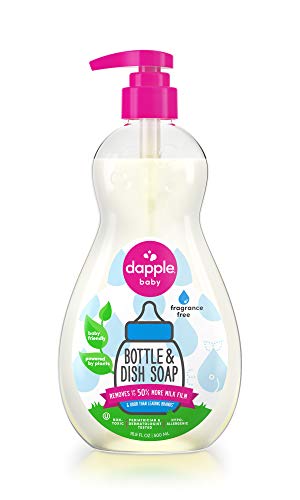

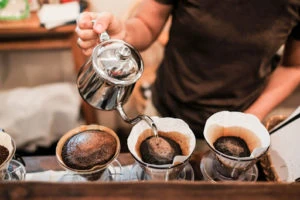
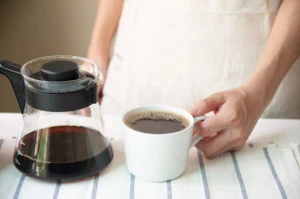
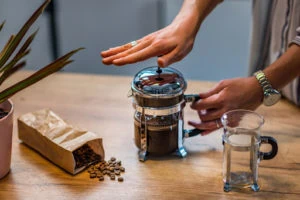
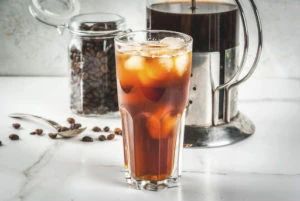

Alexis DeAnda is a food fanatic, library card user, and cast iron hunter, in that order. She has been cooking for anyone that will taste it ever since her mom let her make doughnuts on Saturday mornings at the age of 7.